- Home
- Tad Williams
Sleeping Late on Judgement Day Page 16
Sleeping Late on Judgement Day Read online
Page 16
If for any reason you cannot make Friday’s appointment, please call, and I will be happy to set a new one. It is important that we speak and important that we have no further misunderstandings.
Sincerely,
Baldur von Reinmann
Regional Director
Sonnenrad.org
There was even an address—378 Centennial Avenue, San Judas, CA 90460. Right in downtown, convenient to stores and large coliseums suitable for torchlight rallies.
I couldn’t help it—I laughed as I read it. Physical encounter? Herr von Reinmann must have been referring to his hired strong-arm guy beating the (almost literal) holy shit out of me. But it had all been a misunderstanding, of course. We could work together, me and the Nazis. I would find them very helpful.
“Yeah,” I said. “Just like Poland did.”
I jotted down the address and time, but didn’t bother hanging onto the letter, since other than humor value it wasn’t going to give me anything else useful. I got the pastrami sandwich I’d bought for myself, reheated some of the morning’s coffee, and sat down to eat. By the time I was cleaning crumbs off the table, I’d decided that the Black Sun creeps were too dangerous to be ignored, especially if they had supernatural monstrosities like the Nightmare Children at their disposal. I needed to understand better how they fit in to the whole Eligor-Anaita-feather-horn mishegoss. The quickest way to learn that would be simply to accept their invitation.
• • •
That night, I made a laundry list of the things I was going to need before visiting Baldur and the Blitzkrieg Boys. The Amazons had retired to bed to practice their horizontal calisthenics, so when I’d finished the list, I took a beer and went out into the courtyard of the apartment complex to stretch my legs. There were lights on in a few of the other apartment windows, but so far I hadn’t seen any of the neighbors. That made sense, of course—Caz would have picked a spot for her pied-a-terre where she wouldn’t have to come into contact with others very often. But since I now knew I’d had neo-Nazis practicing black magic above me for weeks in the old apartment, I wondered if I was being too casual about who might be sharing these new digs.
I stayed out for almost an hour. The storm had swept through, but the chilly air hadn’t. It was pretty cold even for an angel, but I was determined to give a messenger from Caz a chance to find me, and the nizzic had seemed to make all its visits after dark. But my only company at this hour was a dog somewhere down the street, who barked loudly and hoarsely, over and over, until he gave up in strangled despair, only to start again a few minutes later, protesting the stupidity of a world where the humans got to sleep inside and be safe and comfortable while he was outside in the cold.
“I know that feel, bro,” I told the dog, then finished my beer and went back inside.
seventeen
sshhhh
THURSDAY WAS library day for me. I intended to put in a good few hours, so I gave the Amazons a map of the places where I needed things picked up, then had them drop me off on Middlefield Street on the outskirts of downtown Jude. Halyna could drive all right, but I doubted she had a license, and based on the trip out, I sure as hell wouldn’t have let her drive my late, lamented Matador. Both women were dressed a bit more soberly today, (at my direction, because the last thing I wanted was to have some of the more dangerous supplies picked up by people who looked like they belonged to an anarchist cell). In fact, the Amazons now looked like a couple of teachers, which was the way I wanted it. Harmless.
“Professional,” I told them as I got out. “If you have any problems, just call me. But be professional!”
“You too much worrying,” Oxana reassured me. “We will shoot nobody.”
The Harper Library downtown had once been San Judas’s first fire station, and still showed its historic roots in the high ceilings and the arches along the facade (which had allowed room for fully loaded hook and ladder trucks to drive out at speed) but a lot had changed in seventy or eighty years. If the brick walls and the Spanish tile roof still looked much the same, the insides were completely different from anything the older citizens would recognize. Twenty years or so before, about the time I first arrived in San Judas, the city had rebuilt the whole thing, gutting the inside, putting in more windows, and expanding outward to the back, including a large garden full of winding paths and benches. Like most libraries, it now had extensive multimedia resources, computers and video-watching rooms and all sorts of other fancy stuff meant to lure in Jude’s jaded, internetted youth. To me, it always seemed a bit like trying to get people to eat their good old healthy lima beans by offering artisan burgers, too, but I’m not a library professional, so what do I know? In fact, I’d only been to the Harper Library at all recently because of business. The head librarian had died at her desk—probably as she would have chosen—and I had a very interesting time seeing her through her judgement. I’ll tell you about that one someday.
Anyway, I had genuine work to do this time, so I settled in with one of the catalog computers and began seeing what I could find on Donya Sepanta. I checked on the other couple of names, too, just to be careful, though I was pretty sure that Sepanta was the one. I kept the reference folks busy bringing me old magazines that hadn’t been digitized and lots of newspapers, in screen-ready form and the old-fashioned, crackly kind.
After half an hour I gave up on the other names and really focused on the Sepanta woman, doing my best to assemble a biography. Considering that she was a major player in the city, especially in the Persian-American community, and very much alive and living only a few miles away, it turned out to be pretty damned hard work.
Despite conflicting information, everyone seemed to think she’d been born in the early 1950s. I found ’52, ’53, and ’55 listed in various who’s-who lists and in those little automated bios that pop up on the screen, primarily as an excuse to rub more advertising against your forebrain. But they all agreed that she was born in Hamadan, which rang a few bells with me, and turned out to be a contemporary city of about half a million in the northwest of Iran. More interestingly, though, it was built on the ruins of Ecbatana, original capital of the ancient Medean Empire and one of the oldest cities in the world.
Her years in Iran were difficult to trace, again because stories conflicted or just left things out, but most of the capsule biographies agreed that her parents had been wealthy, that they’d spent a lot of their time in Europe and America, and that they left Iran for good after the 1979 revolution. Strangely, I couldn’t find any other mention of those parents, or their names, or what happened to them. Well, “strangely” if they were real, because their daughter Donya began to leave a fairly large track in the public record starting in the middle of the 1980s, when she moved from Southern California to little old San Judas.
Since then she had been involved in numerous charity benefits for the creation of community parks and buildings, and was listed as a donor for nearly every single project of any significance to the Persian-American community. She had long supported the resistance to the rule of the Ayatollahs in contemporary Iran and had been listed as one of the backers for the Shah’s son, but (according to one article in a Persian-language newspaper) had fallen out with Reza Pahlavi’s camp over their unwillingness to criticize militant Islam itself.
So she didn’t like the new religion. New to her, anyway, if she was indeed Anaita.
The more I studied, the more Ms. Sepanta seemed to fit. What made me feel almost certain was her unwillingness to be photographed. In picture after picture she was represented only by stand-ins, generally board members of the Sepanta Foundation, her main charity. But everyone who spoke about her personally seemed to mention her beauty and grace as well as her generosity. I’m not saying there’s no such thing as shy philanthropists, but the personal touch helps a lot with fundraising, I’m told—the desire of the hoi polloi to mix with the important and the glamorous. So it felt at least
slightly out of character for the life Donya Sepanta lived. Also, though the fact itself was not given much attention, there was no mention anywhere of her having a family of her own, only her long-gone, largely anonymous parents.
Almost certain I had cracked it, I started looking for anything that might tell me where to find her, but beyond near constant hometown boosterism in the local papers, which usually referred to her as “one of San Judas’s leading citizens,” I couldn’t find much of anything. A few articles suggested she might live in the hills. One article mentioned the Los Altos district, another Woodside, without ever going so far as to say she actually lived there. And based on many mentions of her “frequent travel” and “worldwide circle of influential friends” she wasn’t even at home very much.
I looked up and realized it was getting dark outside. I was just about to pack it in when I stumbled across something very, very interesting in one of the last pieces I’d requested—an old issue of Sunset Magazine, believe it or not. For those of you who’ve never lived in California, Sunset was originally a travel magazine for Southern Pacific Railroad, but it outlived that long ago and is still going strong. It’s a travel, home, and cooking magazine that appeals particularly to the upscale and those who would like to live that way. If you want to know how to make a perfect crab cioppino for eight people, and how to serve it outdoors in your garden pergola on a summer evening while surrounded by the twinkling light of dozens of Mexican luminaria, well, Sunset’s your bet.
And there, to my astonishment, in the June 1988 issue, between articles on pattern-punched aluminum cabinets, tapas bars (still fairly new back then) and managing an extensive garden during drought (a frequent California worry) I found an article titled, “A Persian Oasis in the California Hills.” And the oasis-garden in question belonged to—yes—none other than “Bay Area socialite and philanthropist Donya Sepanta.” I leafed through the article eagerly, not so much admiring the images of the garden, its low walls and pools, cypresses and fruit trees, but looking for a picture of the elusive Donya. I found one, but it was only of her shoulder and hand as she held a pomegranate for the camera. She had a perfectly nice, prettily manicured hand, but that told me almost nothing. A quick read didn’t add anything else useful—a lot of information about Persian-style gardens but nothing else about Ms. Sepanta except a few references to “her view from the rolling California hills” and “looking down on the golden Santa Clara Valley” which was what they used to call the area before it became known primarily for silicon-related reasons.
But just as I was going to give up and go meet the Amazons, one of the smaller pictures in the article caught my eye. It showed a group of square ornamental pools that had been built at the front of the house—its caption mentioned looking down on Santa Clara Valley—and right down in the corner of the picture, beyond most of the roads and greenery filling the space between the nearest pool and the distant bay, a little white finger poked up above the trees, like a shy person trying to summon a waiter. It was Hoover Tower, at the heart of the Stanford Campus. More importantly, it was a landmark with four sides, and thus an orientation to the compass. I emailed the image to myself in the largest format I could find, then went over to the train depot to meet my ride.
• • •
The women were in a boisterous mood.
“We get everything!” said Halyna. She was squinting, leaning so far forward as she drove that her nose was almost against the inside of the windshield. I guessed I should have asked her if she was supposed to wear corrective lenses before giving her my keys, but it was too late now. “Everything. No problem.”
“No, one problem—Packages Plus guy,” Oxana reported cheerfully. Her English was improving, but I still had to work to make out what she was saying sometimes. “He make face, don’t want to give silver powder. ‘Your name not on this!’ he say. ‘This say Robert Dollar. You not Robert Dollar!’” But Halya tell him, “Just because we not Americans don’t mean we not work for American!”
“He’s always careful,” I said. “That’s why I keep a mailbox there. I gave you a note—didn’t you show it to him?”
“I told you,” Halyna said to Oxana. “I say to her, ‘Where is note, Bobby give us note,’ but she tell me no you didn’t.”
“I forgot.” Oxana shrugged and looked guilty. “Leave it in other clothes.”
“It’s okay,” I said. “I see the stuff here so he must have given it to you.”
“After while,” Oxana said, then brightened. “Halyna said, give it or Mr. Dollar will angry, plus I pinch you in the nose.”
“Punch!” said Halyna, indignant. “Word is ‘punch.’”
I rolled my eyes. I was going to have to go in and mend fences at Packages Plus, I could see.
“And we buy this at store. But why you need sugar, Bobby?” Oxana passed me a family-sized bag of C and H granular. “You make some cake?”
“Ha ha,” I said. “I’m going to do a little cooking, yes. I have an important meeting tomorrow, and I’d like to take some treats.” I hadn’t told them about my invitation to meet von Reinmann and his Black Sun buddies yet, so I outlined it in quick strokes.
Halyna was so upset she pulled the car over to the shoulder, right on the Woodside Expressway, which even in the middle of the afternoon, an hour before the commute really got going, was still a bad idea. Horns blasted as the drivers behind us had to press themselves all the way over to the driver’s side of the lane to get by. “You don’t do that! You don’t go alone! They are killers!”
“Just get back on the road please,” I said. “I know what I’m doing. People have been trying to kill me since you were in kindergarten. You may notice that I’m still here.”
“But you don’t know these men. The Black Sun—they are very, very bad. They have powers!”
“Hey, a lot of the folks who hate on me aren’t even human,” I said, but I didn’t make a point of it. I was pretty sure the Amazons still didn’t know I was anything other than another mortal dude, and if I was lucky, Ballsack von Ryebread and his little group didn’t know either. I know it seems like my secret identity is secret to no one, but that’s because most of the people I hang out with already know. The rest of the folks in San Judas who know me think I’m an ordinary guy who just gets into slightly extraordinary situations from time to time.
• • •
For some reason, the Amazons thought me cooking in my boxer shorts was the funniest thing they’d ever seen.
“Look, I’m not just doing this to give you a thrill, ladies. I’m working with some very nasty stuff here, and I only have so many decent pairs of pants.”
“No, is good,” said Oxana. “You have very nice leg.”
“Legs,” Halyna corrected her. “He has two.”
“Maybe she only likes one of them,” I suggested. “Hand me that little plastic jar over there, will you?”
While I was stirring, I asked the Amazons to put on some music. Oxana chose. After about ninety seconds of the ghastly Europop dance music had jolted my brain like badly-administered electroshock, I put down my spoon and changed it for something that worked a bit better with precision and potentially explosive chemicals, in this case Nina Simone’s first album, Little Girl Blue.
“You are old!” said Oxana.
“No, is nice,” Halyna said, listening. “She has a lot of . . . person in her voice.”
“Absolutely right,” I said. “You have that pair of shoes?”
“Why you want shoes?” Halyna said. “And so boring shoes?”
“Because I wouldn’t do this to a pair I wanted to keep.” I took a black oxford out of the box and examined the heel. Hard rubber—perfect. It had to take enough shock to let me walk in it, without being so resilient that it wouldn’t do the job. I took a little fine-grain sandpaper and started scuffing up the polish just a bit. After all, anybody who knows anything about me would be suspicio
us if I showed up with shiny shoes or, Highest forbid, wearing a tie. Most places I hang out, a tie would get me shot as an impostor.
• • •
By the time I’d finished the rest of my preparations, “Central Park Blues” was tiptoeing through the speakers and the Amazons had given up and gone to bed. I finished the cleanup, set everything carefully aside to dry or harden or whatever, then made myself a real drink. Considering I hadn’t set Caz’s apartment on fire or lost any fingers with my chemistry experiments, I figured I’d earned it. I left the hood fan running on the range to clear any fumes, since the place had no windows, and went into the bathroom, where I locked the door, took off my watch, and practiced opening a Zipper, then timing the difference between how long it felt like in the no-Time bubble and how long it actually was. (No, that’s not a euphemism for anything.) Because soon it was going to be in my best interests to be able to judge how much time was passing in the real world while I was Outside.
The rains had ended, so I walked out into the courtyard, clinking ice in my glass and trying not to think too much about the first night I’d been here with Caz, because that hurt too badly. I sometimes thought it would be better if one or both of us had died, because then at least there would have been an end of sorts. Instead we were stuck in this netherworld, for Caz, literally; for me, only figuratively. And although I knew that what I was doing now was my only chance to ever get her back, sometimes I felt like I couldn’t wait any longer—that at some point I was going to start shouting and punching things and that would go on until someone tasered me and hauled me off to a secure ward in Atascadero. But that wouldn’t do Caz any good at all.
Had she even received my message? Why hadn’t she sent one back? Maybe freezing and torturing a nizzic wasn’t the best way to continue communication—how was I supposed to know? Flying booger-demons don’t come with instructions.

 God Rest Ye Merry, Gentlepig
God Rest Ye Merry, Gentlepig Tailchaser's Song
Tailchaser's Song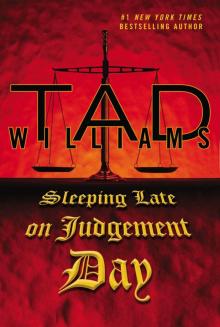 Sleeping Late on Judgement Day
Sleeping Late on Judgement Day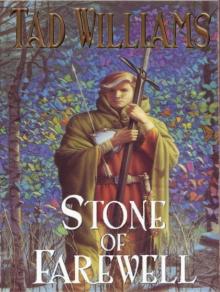 Stone of Farewell
Stone of Farewell The Dragonbone Chair
The Dragonbone Chair Sea of Silver Light
Sea of Silver Light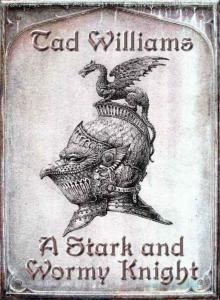 A Stark and Wormy Knight
A Stark and Wormy Knight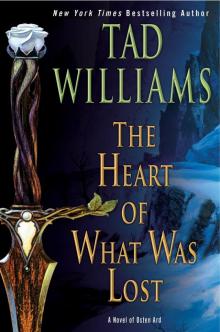 The Heart of What Was Lost
The Heart of What Was Lost Diary of a Dragon
Diary of a Dragon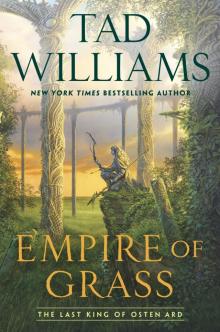 Last King of Osten Ard 02 - Empire of Grass
Last King of Osten Ard 02 - Empire of Grass To Green Angel Tower, Volume 1
To Green Angel Tower, Volume 1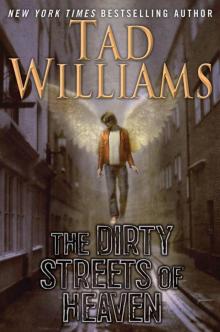 The Dirty Streets of Heaven
The Dirty Streets of Heaven River of Blue Fire
River of Blue Fire The Very Best of Tad Williams
The Very Best of Tad Williams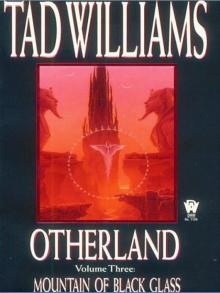 Mountain of Black Glass
Mountain of Black Glass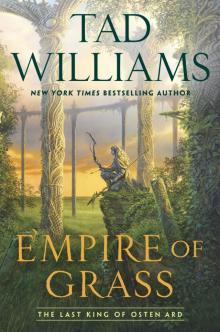 Empire of Grass
Empire of Grass City of Golden Shadow
City of Golden Shadow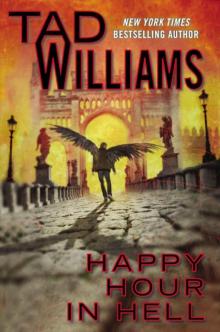 Happy Hour in Hell
Happy Hour in Hell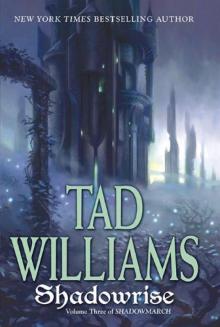 Shadowrise
Shadowrise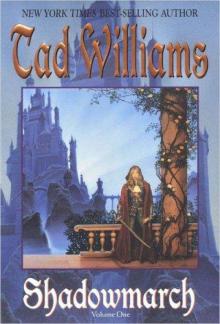 Shadowmarch
Shadowmarch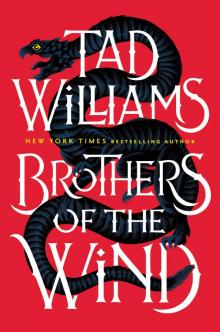 Brothers of the Wind
Brothers of the Wind Shadowheart
Shadowheart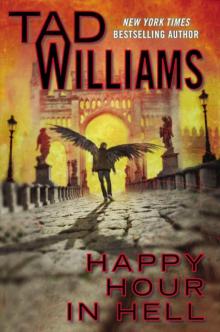 Bobby Dollar 02 - Happy Hour In Hell
Bobby Dollar 02 - Happy Hour In Hell The War of the Flowers
The War of the Flowers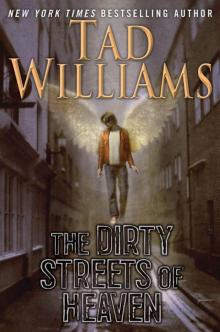 The Dirty Streets of Heaven bd-1
The Dirty Streets of Heaven bd-1 Tad Williams - The War of the Flowers (retail) (pdf)
Tad Williams - The War of the Flowers (retail) (pdf) Shadowheart s-4
Shadowheart s-4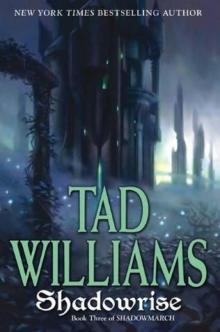 Shadowrise s-3
Shadowrise s-3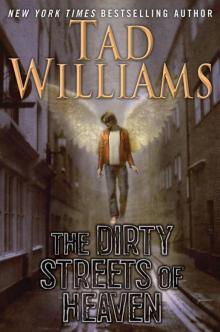 The Dirty Streets of Heaven: Volume One of Bobby Dollar
The Dirty Streets of Heaven: Volume One of Bobby Dollar The Stone of Farewell
The Stone of Farewell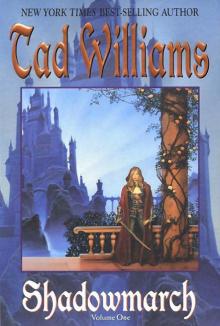 (Shadowmarch #1) Shadowmarch
(Shadowmarch #1) Shadowmarch The Secrets of Ordinary Farm of-2
The Secrets of Ordinary Farm of-2 Shadowmarch s-1
Shadowmarch s-1![Bobby Dollar [04] God Rest Ye Merry, Gentlepig Read online](http://i1.bookreadfree.com/i1/04/06/bobby_dollar_04_god_rest_ye_merry_gentlepig_preview.jpg) Bobby Dollar [04] God Rest Ye Merry, Gentlepig
Bobby Dollar [04] God Rest Ye Merry, Gentlepig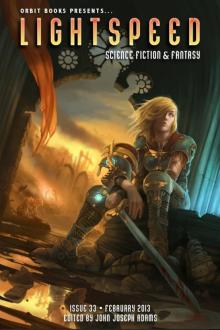 Lightspeed Issue 33
Lightspeed Issue 33 Sea of Silver Light o-4
Sea of Silver Light o-4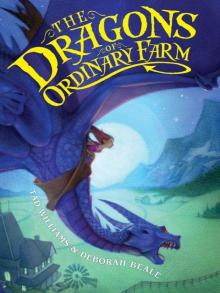 The Dragons of Ordinary Farm of-1
The Dragons of Ordinary Farm of-1 Shadowplay s-2
Shadowplay s-2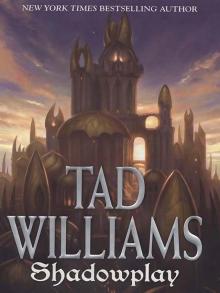 (Shadowmarch #2) Shadowplay
(Shadowmarch #2) Shadowplay